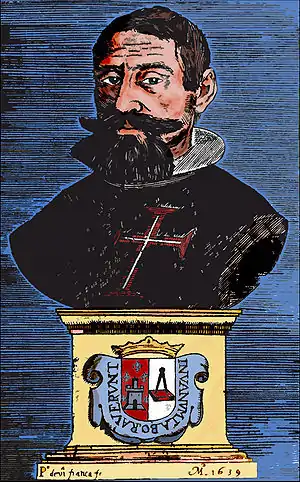Manuel de Faria e Sousa (Portuguese pronunciation: [mɐnuˈɛl dɨ fɐˈɾiɐ i ˈsozɐ]; Spanish: Faria y Sousa; 18 March 1590 – 3 June 1649) was a Portuguese historian and poet. He frequently wrote in Spanish.

He was born into an ancient Portuguese noble family, probably at Pombeiro, studied in Braga for some years, and when he was about fourteen, entered the service of the Bishop of Porto. With the exception of about four years, from 1631 to 1634, during which he was a member of the Portuguese embassy in Rome, the greater part of his later life was spent in Madrid, where he died in June 1649.
He was married to Catarina Machado, the "Albania" of his poems, which enabled him to lead a studious domestic life, dividing his cares and affections between his children and his books. His first big work, an Epitome de las historias Portuguezas (Madrid, 1628), was favorably received; but some passages in his enormous commentary upon the Portuguese epic Os Lusíadas, the poem of Luís de Camões,[1] excited the suspicion of the inquisitors, caused his temporary incarceration, and led to the permanent loss of his official salary. In spite of the enthusiasm that is said to have prescribed to him the daily task of twelve folio pages, death overtook him before he had completed his hugest enterprise, a history of the Portuguese in all parts of the world.
Several portions of the work appeared at Lisbon after his death, under the editorship of Captain Faria e Sousa : Europa Portugueza (1667, 3 vols.); Ásia Portugueza (1666–1675, 3 vols.); África Portugueza (1681). As a poet, Faria e Sousa was nearly as prolific; but his poems are vitiated by the prevailing Gongorism of his time. They were for the most part collected in the Noches claras (Madrid, 1624–1626), and the Fuente de Aganipe, of which four volumes were published in Madrid in 1644–1646. He also wrote, from information supplied by P. A. Semmedo, Imperio de China i cultura evangelica en l (Madrid, 1642), and translated and completed the Nobiliário of the Count of Barcelos.
There are English translations by J. Stevens of the History of Portugal (London, 1698), and of Portuguese Asia (London, 1695).
Works

- Muerte de Jesus y llanto de Maria. Madrid, 1623
- Fabula de Narciso e Echo. Lisboa, 1623. In Portuguese
- Divinas e humanas flores. Madrid, por Diego Flameco 1624
- Noches claras. Madrid, por Diego Flameco 1624
- Fuente de Aganipe y Rimas varias. Madrid, por Sanchez 1644, 1646. In Portuguese and Spanish. In seven parts:
1a : 600 sonetos
2a : 12 "poemas em outava rythma, silvas e sextinas[1]"
3a : canções, odes, 200 madrigals ("madrigales"), sextinas e tercetos
4a : 20 eclogas
5a : redondilhas, glosas, cantilenas, decimas, romances e epigramas
6a : "Musa nueva" com sonetos, oitavas, tercetos, canções, etc. reduzidos a versos octosilabos
7a : "Engenho" de acrostichos, esdrúxulos, ecos, etc.
- Epithalamio de los casamientos de los señores Marqueses de Molina. Saragoça, 1624
- Epitome de las historias portuguesas. Madrid, por Francisco martinez 1628
Is the same work amplified later with the title of Europa portuguesa.
- Escuriale por Jacobum Gibbes Anglum. Madrid, 1658. tradução em castelhano duma descrição do Escurial em latim.
- Lusiadas de Luis de Camoens, principe de los poetas de España. Comentadas. Madrid, por Juan Sanches, 1639.
Say Faria, That begins this work in 1614, using 25 years, examining more than thousand authors, and between this ones 300 Italians.
- Informacion a favor de Manuel de faria y sousa etc., 1640
- Peregrino instruido
- Imperio de la China e cultura evangelica en el, etc.
- Nenia : poema acrostico a la reyna de España D. Isabel de Bourbon. Madrid, 1644
- Nobiliario del Conde de Barcellos D. Pedro, hijo delrey D. Dionis de Portugal, traducido etc. Madrid, 1646
- El gran justicia de Aragon Don Martin Baptista de Lanuza. Madrid, 1650
- Asia Portuguesa. 3 tomos :
1° Lisboa, Henrique Valente de Oliveira, 1666 : History of Índia, since it discovery until 1538.
2° Lisboa, Antonio Craesbeeck de Mello, 1674 : History of Índia, from 1538 to 1581
3° Lisboa, ibidem, 1675 : History of Índia, during the Spanish dominion (1581 - 1640).
- Europa Portuguesa. 3 tomos :
1° Lisboa, Antonio Craesbeeck de Mello, 1678 : From universal diluvio to Portugal with king.
2° Lisboa, Ibid, 1679 : From Government of Count D. Henrique to D. João III.
3° Lisboa, Ibid, 1680 : From king D. Sebastião to Filipe III of Portugal.
- África Portuguesa. Lisboa, Antonio Craesbeeck de Mello, 1681 : History of conquest from D. João I to year 1562.
- Rimas varias de Luis de Camoens, etc. comentadas. Lisboa, Theotonio Damaso de Mello, 1685.
References
Footnotes
- ↑ "The Lusiads". World Digital Library. 1800–1882. Retrieved 2013-08-30.
Sources
- This article incorporates text from a publication now in the public domain: Chisholm, Hugh, ed. (1911). "Faria y Sousa, Manuel de". Encyclopædia Britannica. Vol. 10 (11th ed.). Cambridge University Press. p. 177.